Olmstead at 20: Promises Kept, Promises Unfulfilled
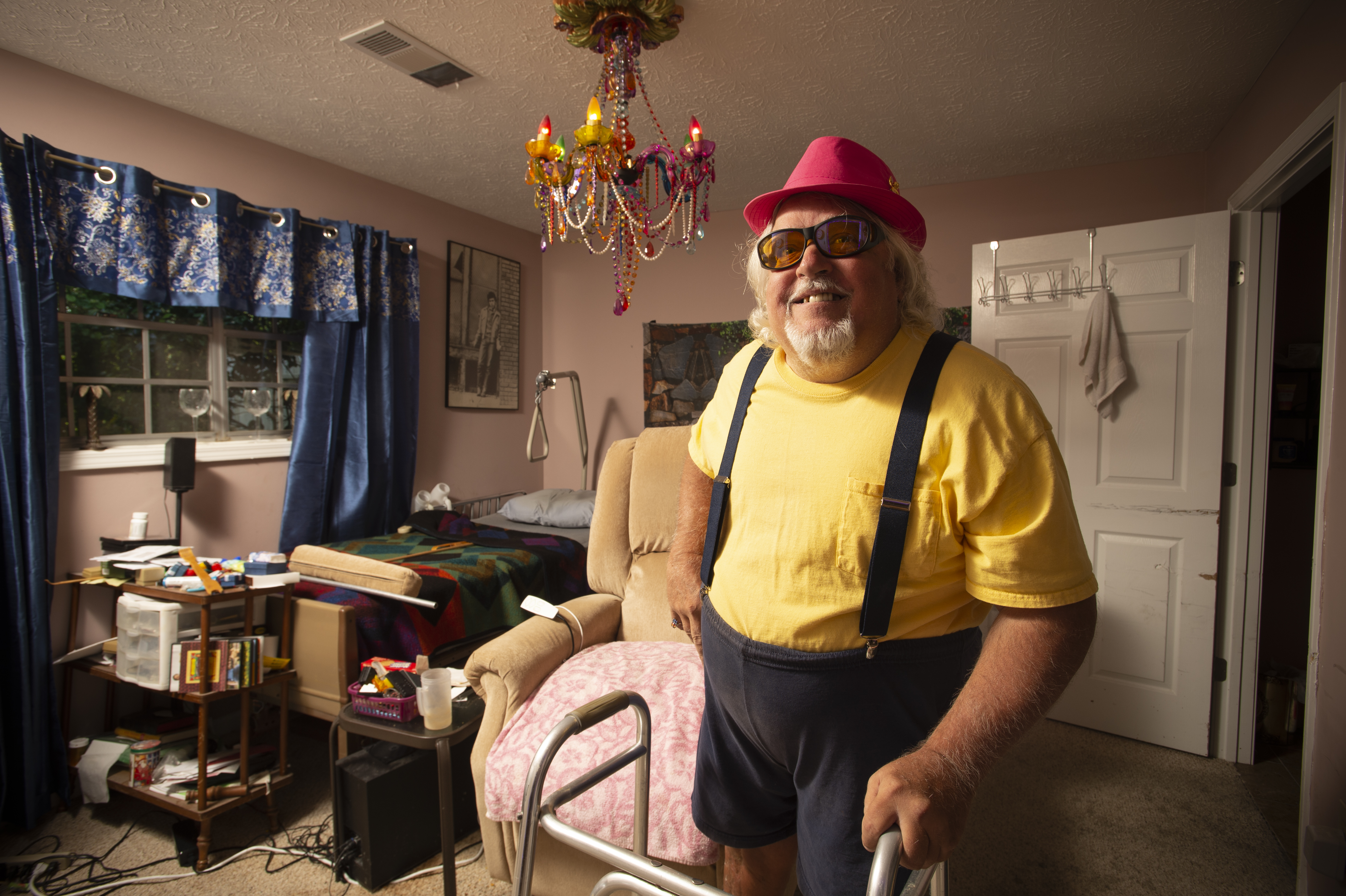
Story by Robin McDonald. Photographs by Robin Rayne.
Olmstead v. L.C. and E.W.: The landmark Supreme Court ruling heralded as the the disability community’s Brown v. Board of Education turns 20.
*************************************************
Whenever family was at stake, Nafeesah Shaheed was a fierce and tireless fighter.
Until a medical accident catastrophically starved her brain of oxygen, leaving her bedridden and no longer able to speak, the social worker with advanced degrees from Columbia University and Hunter College in New York devoted her life to rescuing and reuniting troubled families.
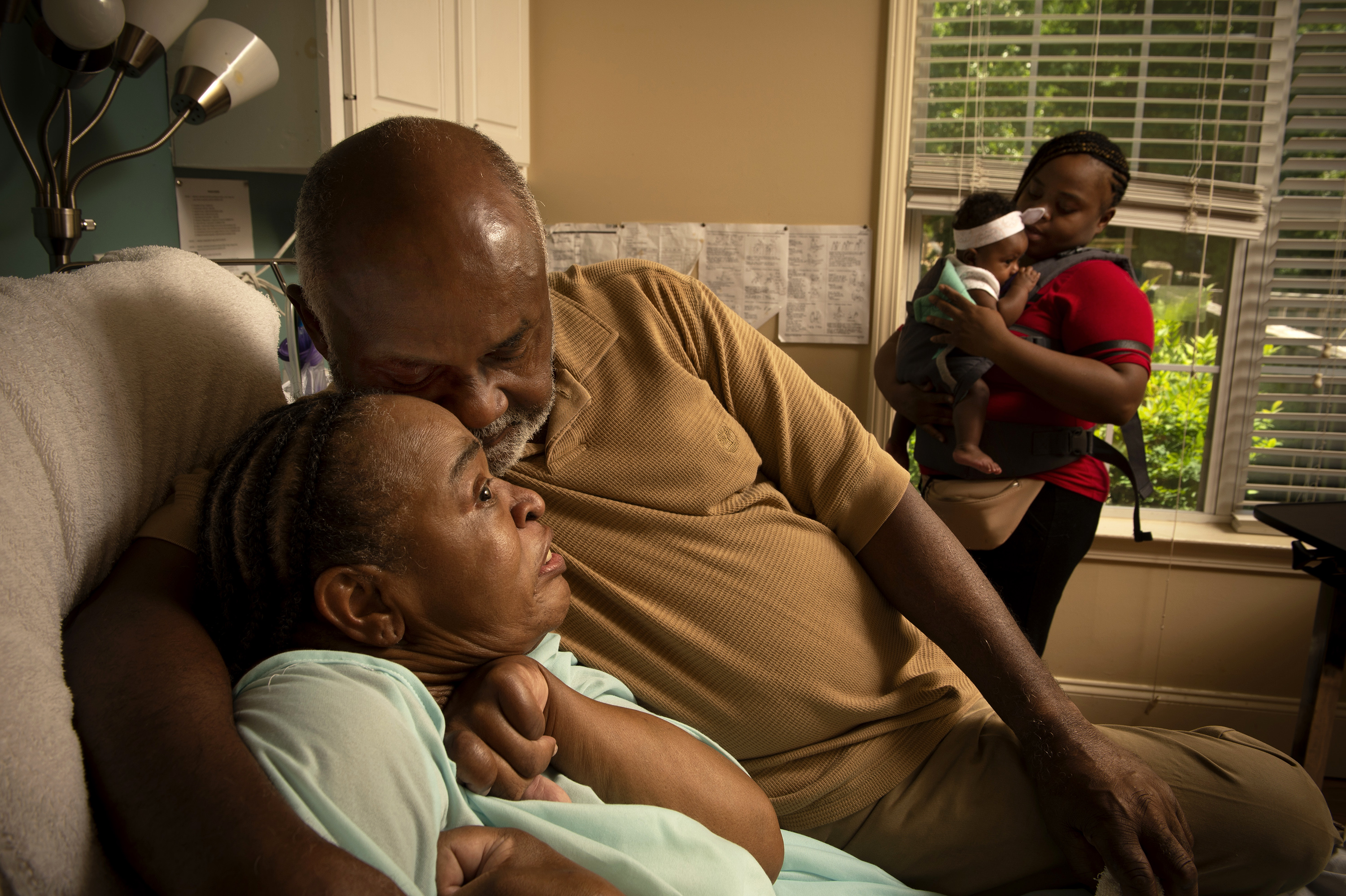
Nafeesah Shaheed and her family (Photo by Robin Rayne)
“She would have people calling her at 3 a.m.,” recalled her husband, Abdullah Shaheed. She would sit in a rocking chair by the window in the family dining room in the predawn dark for hours as she counseled the anguished, the troubled, and the desperate, he recalled.
She was wherever families were at risk. Her favorite saying was this, her daughter said: “Saving humanity is everybody’s business.”
The medical trauma that permanently altered the life of a woman devoted to reuniting families also deprived her of her own. Requiring around-the-clock care, Shaheed was shunted from the hospital to a rehabilitation center to a nursing home where her husband and daughter say she foundered and what ability she had to speak receded and then died away.
Restricted as to when they could visit Shaheed and at growing odds with nursing home personnel who parked the formerly vibrant woman in a wheelchair and left her unattended for hours, her husband and her eight children resolved to bring her home.
They succeeded with the help of lawyers at the Atlanta Legal Aid Society and a landmark U.S. Supreme Court ruling that Legal Aid originated. Olmstead v. L.C. and E.W. marks its 20th anniversary this year.
Handed down by the U.S Supreme Court in 1999, Olmstead elevated community-based settings for people with disabilities to a civil right.
Nearly two decades later, Olmstead allowed Shaheed’s family to secure the federal financial assistance they needed to care for their wife and mother at home.
“She is back with her family, which is exactly what she needed,” said Susan Walker Goico, director of Atlanta Legal Aid’s Disability Integration Project. “There is no reason for her to be segregated away from her family. … It’s a beautiful bond that they have.”
The Olmstead case began as many of the Atlanta Legal Aid Society’s cases do— a single complaint on behalf of two women with intellectual and psychiatric disabilities and no one to turn to for help.
Elevated to the U.S. Supreme Court by the state of Georgia, which defended institutionalization, the four-year legal battle unlocked the doors of a Georgia psychiatric hospital for Lois Curtis and Elaine Wilson.
The two women — who had been institutionalized dozens of times in a revolving door of uneven care — were patient inmates when Legal Aid lawyer Sue Jamieson resolved to take their case.
Curtis, then in her 20s, had a diagnosed intellectual disability and schizophrenia. Wilson, in her 40s, also had an intellectual disability — the result of a protracted high fever when she was a toddler. But their treating physicians said they did not belong in the hospital and community-based living arrangements would better address their needs.
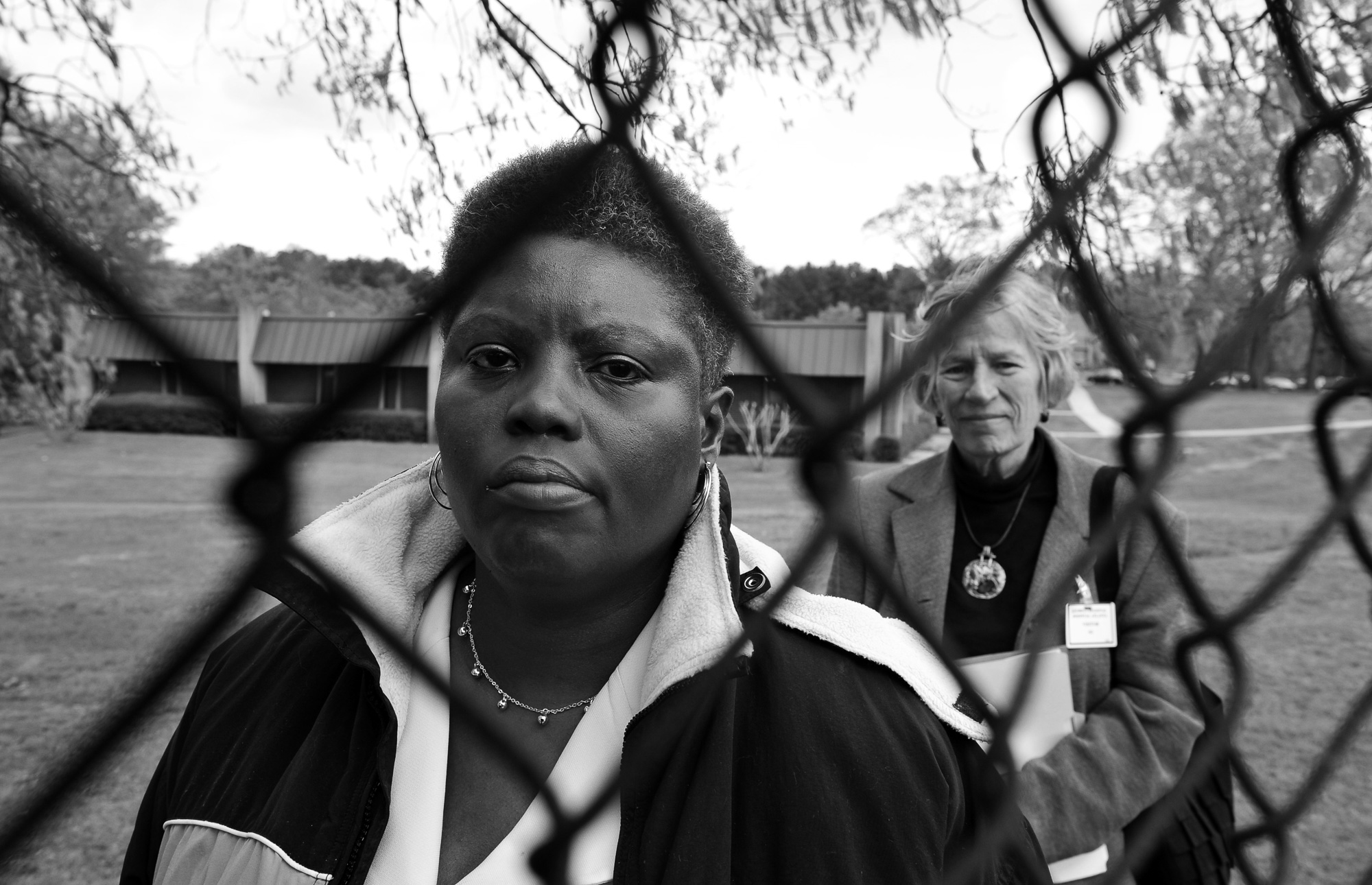
Lois Curtis with her Legal Aid Lawyer, Sue Jamieson (Photo by Robin Rayne)
Four years later, the U.S. Supreme Court heard their case and determined that the “unjustified isolation” of people with disabilities in institutions is a form of discrimination.
“Institutional placement of persons who can handle and benefit from community settings perpetuates unwarranted assumptions that persons so isolated are incapable or unworthy of participating in community life,” wrote Justice Ruth Bader Ginsburg, who authored the majority opinion for a divided court.
“Confinement in an institution severely diminishes the everyday life activities of individuals, including family relations, social contacts, work options, economic independence, educational advancement, and cultural enrichment.”
Olmstead was never intended to empty out and shut down state-funded institutions housing disabled citizens, while leaving them with nowhere else to go. The Supreme Court required treating professionals first to determine whether community-based treatment was appropriate, then to make sure disabled patients didn’t object to moving, and to make certain community placement could be “reasonably accommodated” given the available public resources.
Georgia officials argued that community placement for Curtis and Wilson was too expensive. But U.S. District Judge Marvin Shoob, the federal trial judge in Atlanta who handed down the original Olmstead ruling, compared the cost of caring for Curtis and Wilson in a community-based setting with the cost of institutionalizing them. That simple comparison showed that on an annual basis, institutional care for Wilson and Curtis cost more than twice as much as community care — a finding reflected in the Supreme Court opinion.
Shoob’s order “laid down the framework,” said Charles Bliss, the Atlanta Legal Aid Society’s director of advocacy, who joined with Jamieson to litigate the case. “It comes from looking at the facts, instead of listening to the state yelling the sky is falling.”
Housing a person in a psychiatric hospital costs the state about $1,230 per person per day, said Goico. “It’s almost always cheaper to serve someone in the community.”
Disability advocates heralded Olmstead as the disabled community’s Brown v. Board of Education. It became a beacon and a promise for people with disabilities confined in state hospitals, nursing homes, or jail that their disabilities needn’t condemn them to a life of confinement.
But if Olmstead offered a landmark promise, it resembled Brown in another more problematic way. Reluctant to drive the states to systematically empty their institutions without giving patients a place to go, the Supreme Court decided that if states could demonstrate they had a plan for placing people with disabilities in supportive, community-based settings, and that waiting lists for those services “moved at a reasonable pace,” no state would run afoul of the preference for community-based treatment established by Olmstead.
“Basically, a functioning plan was a defense to taking action,” Bliss explained. “The idea was that the states, as in Brown, were going to be treated as responsible actors and given the responsibility to turn this huge ship away from institutions and toward community placement.”
But like Brown, “That hasn’t happened with much speed at all,” Bliss observed. “It’s now time to say to the states, ‘Your time is up. It simply must be done. … The time for slowly developing remedies has passed.”
Samuel Bagenstos, a University of Michigan law professor and a former principal deputy attorney general for civil rights at the U.S. Justice Department told a 20th anniversary conference on Olmstead at Georgia State University School of Law in August that today the demand for community settings for people with disabilities “far outstrips what states have been willing to provide.”
Shaheed’s family may have realized Olmstead’s promise. But Bagenstos said more than 700,000 citizens with disabilities across the nation remain on waiting lists for support services available through Medicaid since the early 1980s that would let them live on their own, with family, or in personal care homes tailored to their needs. As of August 2019, there were more than 6,000 on the waiting list for developmental disability services in Georgia alone, according to a state report.
“Every state has invested in community services but there is still so far to go,” said Goico. “Many people are still unnecessarily institutionalized or living at risk of institutionalization due to inadequate community-based funding.”
What happened to Shaheed can happen to anyone, Goico said. No one’s family is immune from a catastrophic injury, disease, mental illness, dementia, autism, or a developmental or physical disability.
“We will all need assistance at some point,” she added. “We shouldn’t have to give up freedom to get it.”
Like Shaheed, Charles Anderson confronted a medical crisis that stripped him of independence and confined him to a nursing home. Anderson has cerebral palsy. But as a younger man, the disability never slowed him down. With crutches, he could walk and work and dance.
Anderson performed with a troupe of other “non-able-bodied people” and frequented Atlanta dance clubs, where he sent crutches trimmed in patent leather sailing to the ceiling lights. He would catch them as they came back down.
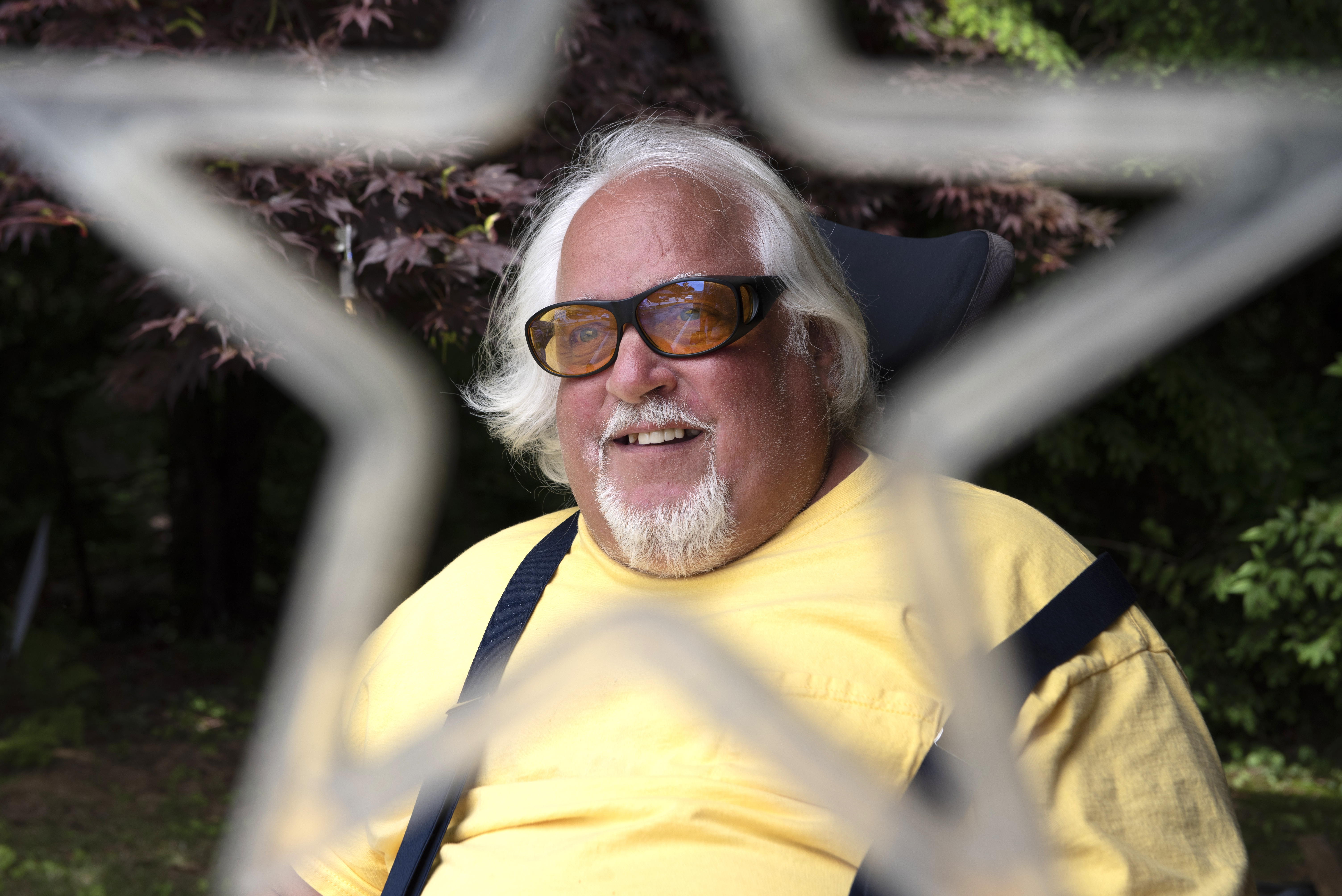
Charles Anderson (Photo by Robin Rayne)
“I have always been a survivor,” he said. “I never had a body that worked correctly.” “But I was really good on my feet,” he said. “I had pretty good balance.” And, he added, “I was a really good lead” on the dance floor.
Severe complications from knee surgery when he was in his 50s cost Anderson his job, his apartment, and his freedom. He spent weeks recuperating in the hospital, lost any ability to walk, and eventually relegated him to a nursing home. For nearly three years Anderson — a man with a genial nature, a big heart, and inquisitive mind — spent his days parked in a wheelchair or confined to bed.
Anderson remembers having to ask nursing home aides for a bath and going as long as three weeks without one. “I cried,” he said. “I had to learn to be careful, not to ask for too much.”
“As things went on, I lost my place,” he explained. “I was turned off. I wasn’t out of touch; I was just on hold.”
Then he met paralegal Toni Pastore, manager of Legal Aid’s Disability Integration Project. Pastore helped Anderson qualify for community support services, kept his spirits up while he remained on the waiting list, and alternately prodded and encouraged him to believe that he could make it on his own.
Anderson, too, got busy — but only after he came to believe that he could make it on his own once more. When he found an apartment on the 500-acre campus of Christian City south of Atlanta, he let Pastore know he was ready to move.
“I always knew in my heart I would leave,” said Anderson, who now lives in a Christian City duplex. But without Pastore’s help, “I just didn’t know how.”
Every morning, an aide arrives to help Anderson out of bed, assists him to bathe and dress, and fixes breakfast. Anderson can put himself to bed at night. That support has allowed him to embark on a “third chance at life.”
“A new me has emerged,” he said. “I wasn’t going to be seen for the wheelchair. I would be seen for me. And I was going to be okay.”

Charles Anderson in his new apartment (Photo by Robin Rayne)
Goico said Anderson’s new life is “the gold standard for the way it should be.”
“When we institutionalize people like Charles, we deprive our entire community of his joy and life force,” she said.
“People with disabilities really need to be seen and heard and loved,” said Pastore. “Finding joy is a big deal.”
But 20 years after Olmstead, others with disabilities have yet to realize its promise. Young men from fractured families with a trifecta of behavioral problems, developmental disabilities and poor impulse control are more likely to land in jail where, without an advocate, they may languish for months, or even years with little or no treatment.
Brenden Mercer and Mikaiah Epps are among them.
After an altercation with his mother’s boyfriend, Mercer was charged with aggravated assault and taken to the Fulton County Jail. Epps was jailed in DeKalb County after a similar fight with his stepfather. With no one able to post bail, both remained in custody for the better part of a year.
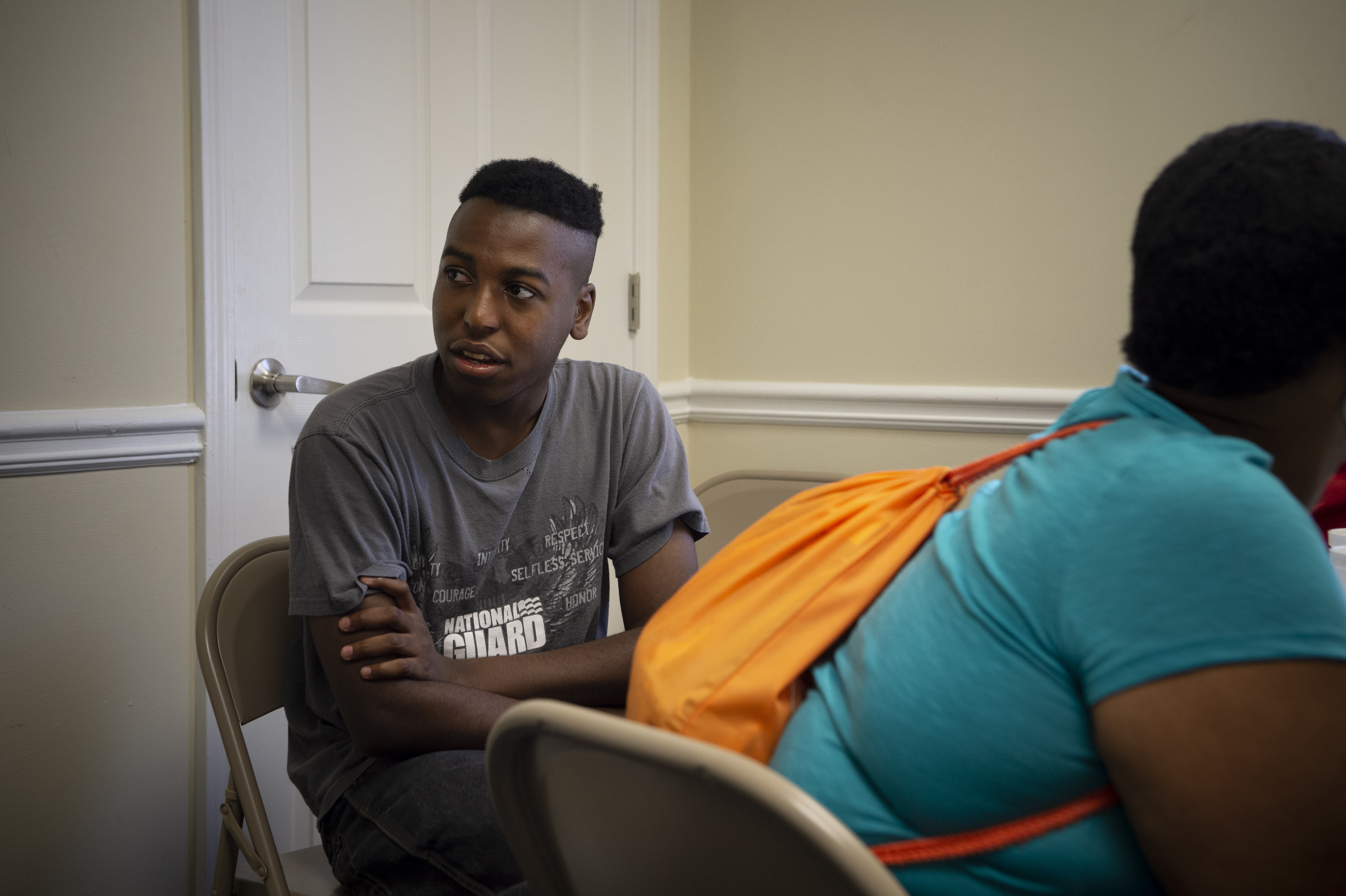
Brenden Mercer(Photo by Robin Rayne)
Goico said when county public defenders alerted her to Epps’ plight, she sought a Medicaid developmental disability waiver that would give him access to housing with trained caregivers, and to social workers, psychologists, job counselors, and behavioral specialists.
The Medicaid waiver programs provide core services that allow people with disabilities to live at home or in a community setting rather than an institution. But states have broad discretion in designing the waivers and often cap annual enrollment.
In Epps’ case, the state’s developmental disability staff denied the waiver, insisting that mental illness, not an intellectual disability, was Epps’ primary problem, Goico said. But their counterparts who handled services for those with mental illnesses thought otherwise.
“We in Georgia have a hard time serving people who have both mental illness and developmental disabilities,” Goico said. “The two systems point to each other and say, ‘He’s not mine, he’s yours.’ That’s what is happening here.”
Goico said she appealed, but when Epps was finally released from jail, his status remained in limbo. Eventually, the state approved his waiver. But to get access to the services, Epps had to rise to the top of a waiting list of more than 6,000.
So, he went back home where new quarrels erupted with his stepfather. At risk of being arrested and jailed again, Epps moved to a private transitional home. He ran away, and eventually began sleeping in the hallway of a homeless shelter.
Meanwhile, the state balked at assigning Epps to a state-funded, short-term crisis home, claiming that being homeless wasn’t a crisis, Goico said. “If that’s not a crisis, I don’t know what is,” she said.
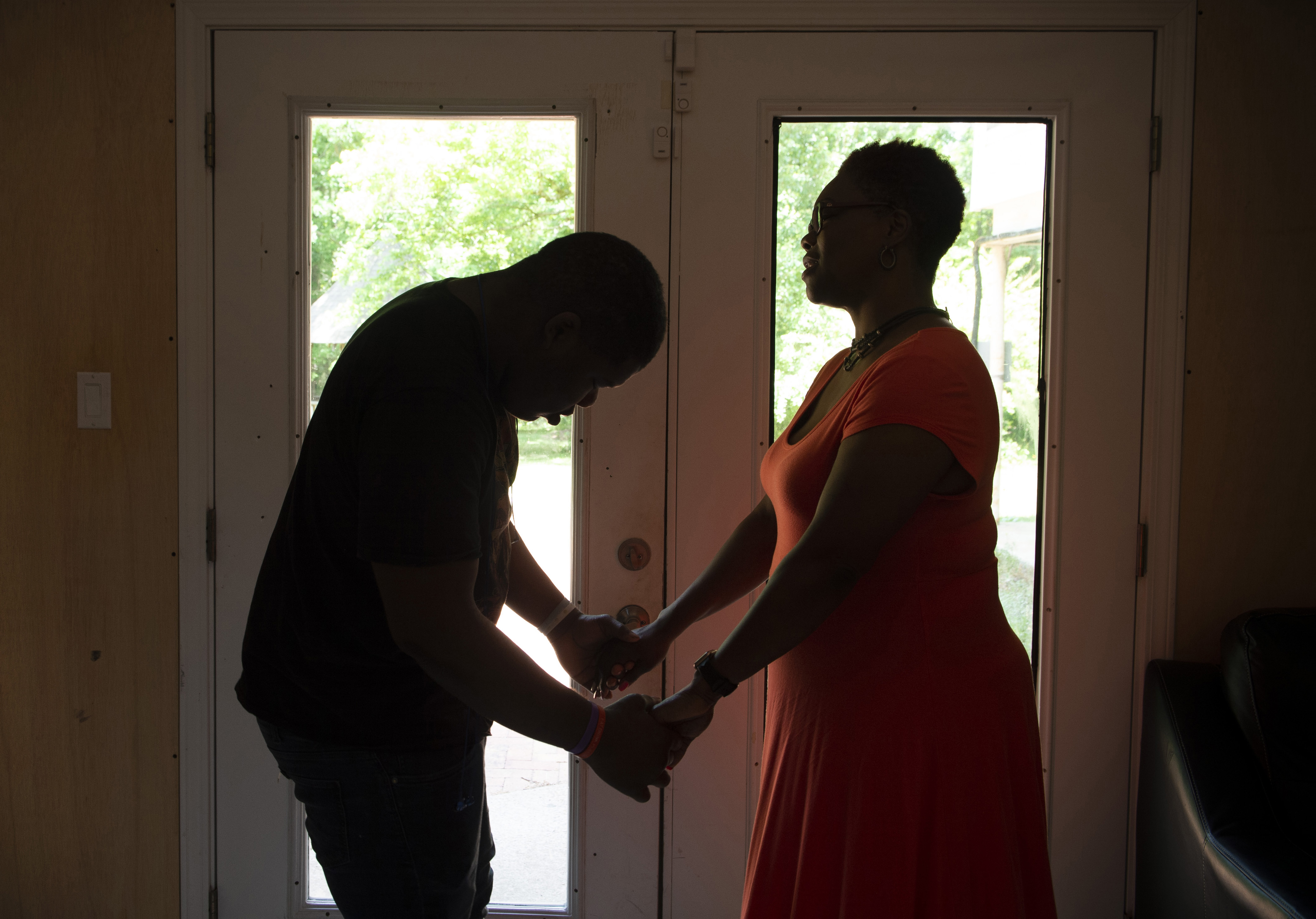
Mikaiah Epps (Photo by Robin Rayne)
Goico described the 20-year-old as “very vulnerable.” Epps loves to read, she said. His favorites feature “Captain Underpants” and “Diary of a Wimpy Kid.” Last fall, Epps was finally placed in a state-funded crisis home.
It was little more than a boarding house with meals and a bed, she said. Epps lived in a room in the basement. “He rarely got to go out,” Goico said. “He was just sort of stuck there in a holding pattern.”
Epps’s story had a happy resolution. In June, the state relented, moved him off the waiting list, and placed him in a Medicaid-funded group home where he has access to extensive support services and counseling, Goico said.
Mercer’s story is very similar, but the outcome remains less sure.
Mercer, too, has dual diagnoses of an intellectual disability and mental illness, Goico said. He, too, remained in jail because he had no place to go.
Mercer says no one visited him in jail. When he was released on probation as a first offender, he returned home to find his mother, grandmother and baby sister were gone. They had changed the phone numbers and moved without leaving a forward address and without letting him know.
“Why would she do that?” Mercer would ask. “Why would she leave and not tell me?”
Since his release, Mercer has passed through four private transitional homes run by individuals not affiliated with the state who generally make their money from their clients’ disability checks, Goico said.
While talking with his lawyer, Mercer suggested that his own behavior may have led to his ouster from the temporary homes. At one, he left a pan of eggs on the stove to burn. Police took him from one home to the hospital after he called 911.
“People didn’t want me,” he said.
Mercer said his trips via a police patrol car to Grady Memorial Hospital in downtown Atlanta is an old story. He said his mother often called police and had him taken there.
Mercer misses her. He punctuates every conversation with, “I would like to know where my family is.”
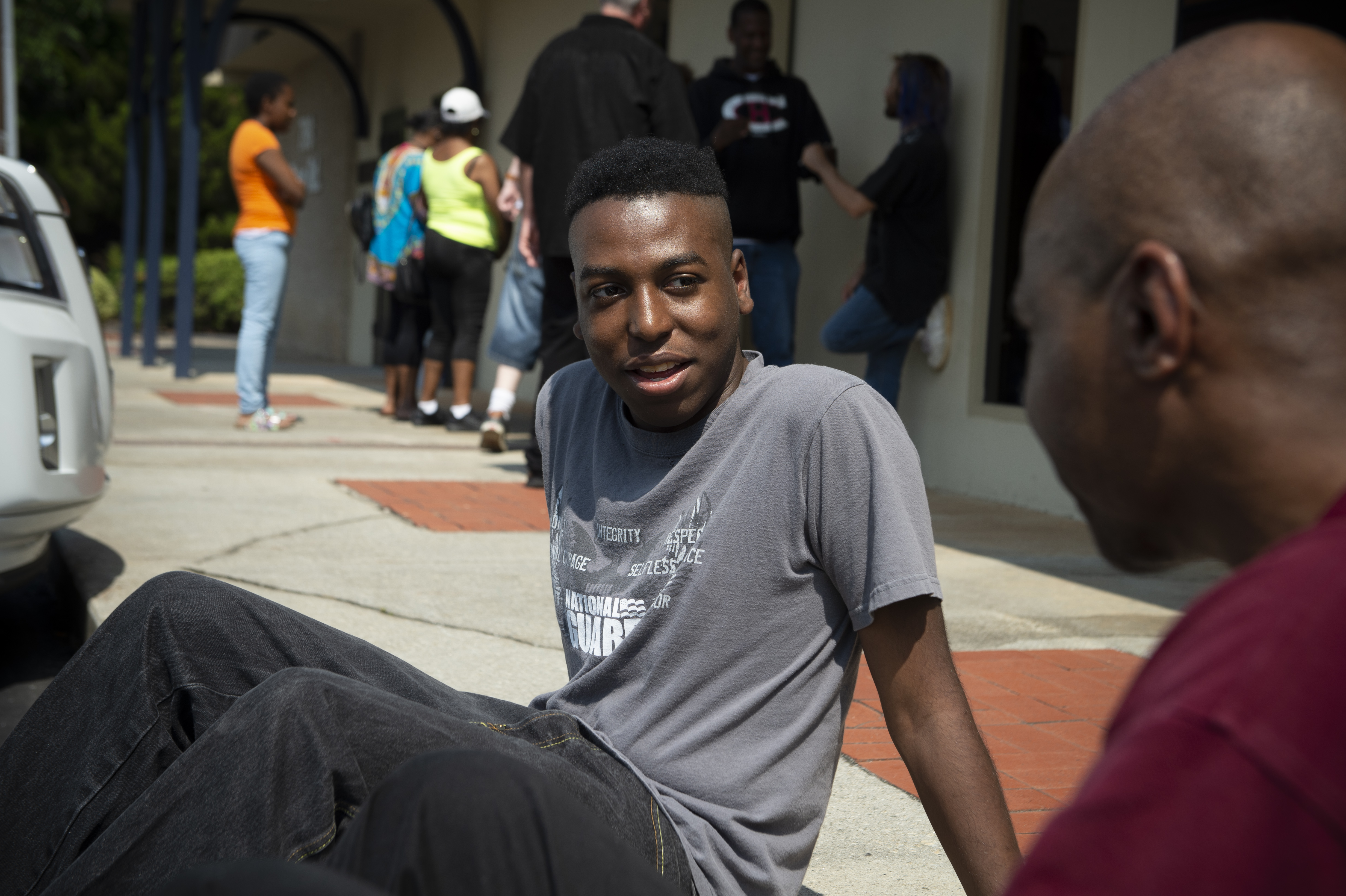
Brenden Mercer (Photo by Robin Rayne)
“Where can they be?” he asks a visitor. “It’s a mystery. I have no clue. They are lost in the sauce.”
Goico is convinced that if she can secure a Medicaid waiver and find a group home for Mercer where he will get medical, behavioral and psychological support, “We can turn his life around.”
Otherwise, she said, he will continue to travel through what she calls “the shadowy, underground, alternative universe” of private transitional homes until he ends up back in jail.
But the state has denied Mercer a disability waiver. “They say we didn’t give them enough proof of his intellectual disability,” Goico said. “Meanwhile, Brenden is still in limbo. He is not getting what he needs.”
Neither is Maurice Smith, although his plight is not as tenuous.
Locked in the forensic unit of East Central Regional Hospital in Augusta, Smith is hoping against weary hope there is someone somewhere who can help him.
His physicians, his social workers, his nurses, his caretakers, his lawyer all say Smith doesn’t belong in a psychiatric hospital, and that he should not be living behind the locked doors of a forensic unit with inmates who have been judged incompetent to stand trial or found not guilty by reason of insanity. They say there is no reason why he can’t leave – except there is no place for him to go.
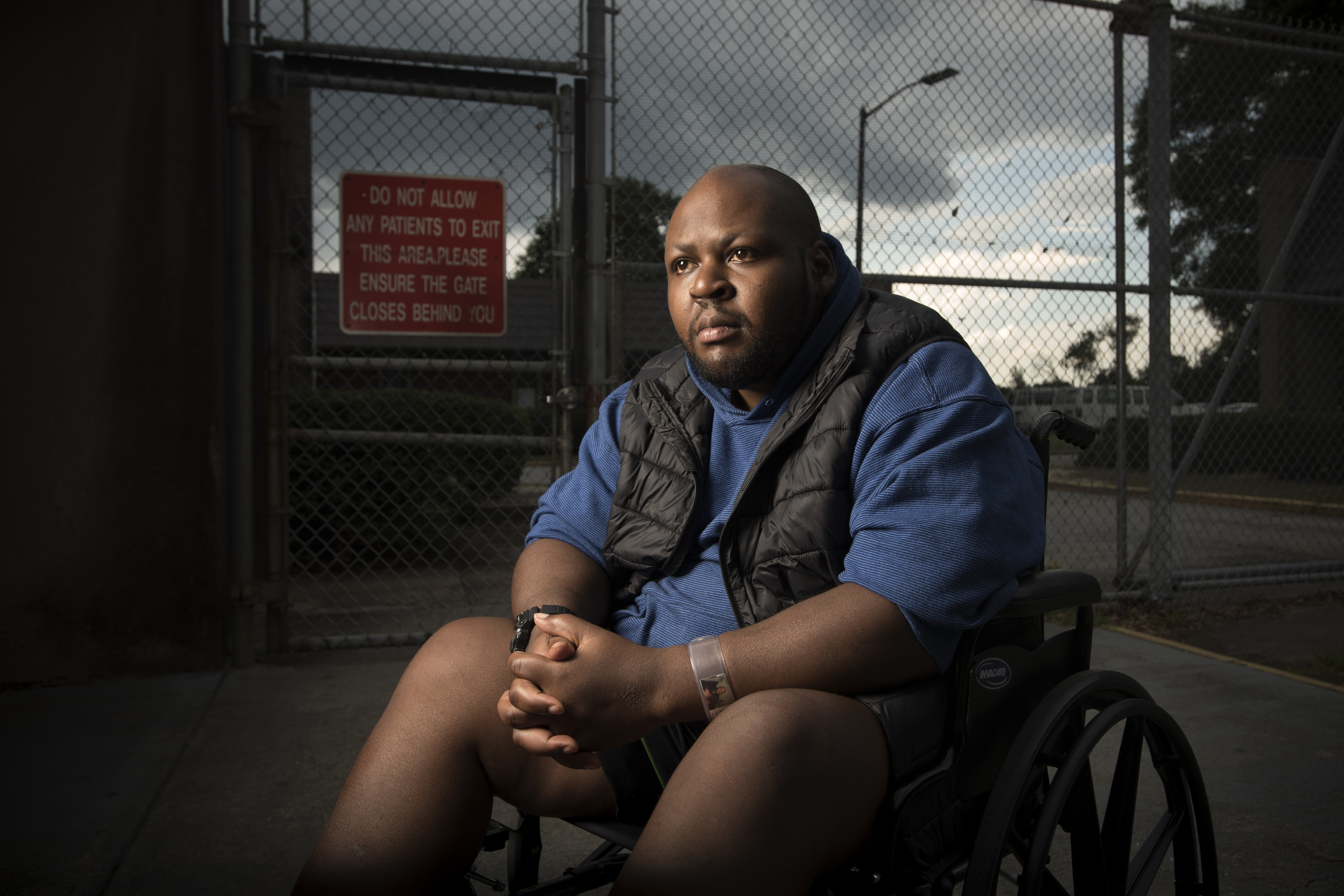
Maurice Smith in the forensic unit of East Central Regional Hospital in Augusta (Photo by Robin Rayne)
Smith asks anyone willing to listen the question uppermost in his mind for the past 8 years: “When am I getting out of here?”
Diagnosed with an intellectual disability and multiple sclerosis, dependent on a wheelchair for mobility, Smith remains institutionalized because of a shortage of community group homes capable and willing to shelter individuals with profound physical needs and a history of complicated behavior.
‘You can’t go outside when you want to, you can’t get fresh air when you want to, you have to ask to go outside,” Smith said.
‘I have bad dreams in the hospital,” he said. “Don’t leave me. I want you to stay all day with me and talk.”
Said Goico: “We just need to keep a light on him so he isn’t forgotten.”
The folks we work with are the most hidden,” Goico reflected. “So many of my clients have been ignored most of their lives…They don’t get a chance to tell their story.”
But, she said, “They have such a hunger for life. They figure out how to make it to the next day.”
“Our clients, they’re survivors.”
Other photographs of our clients by Robin Rayne for Picturing Justice 2019 are below.
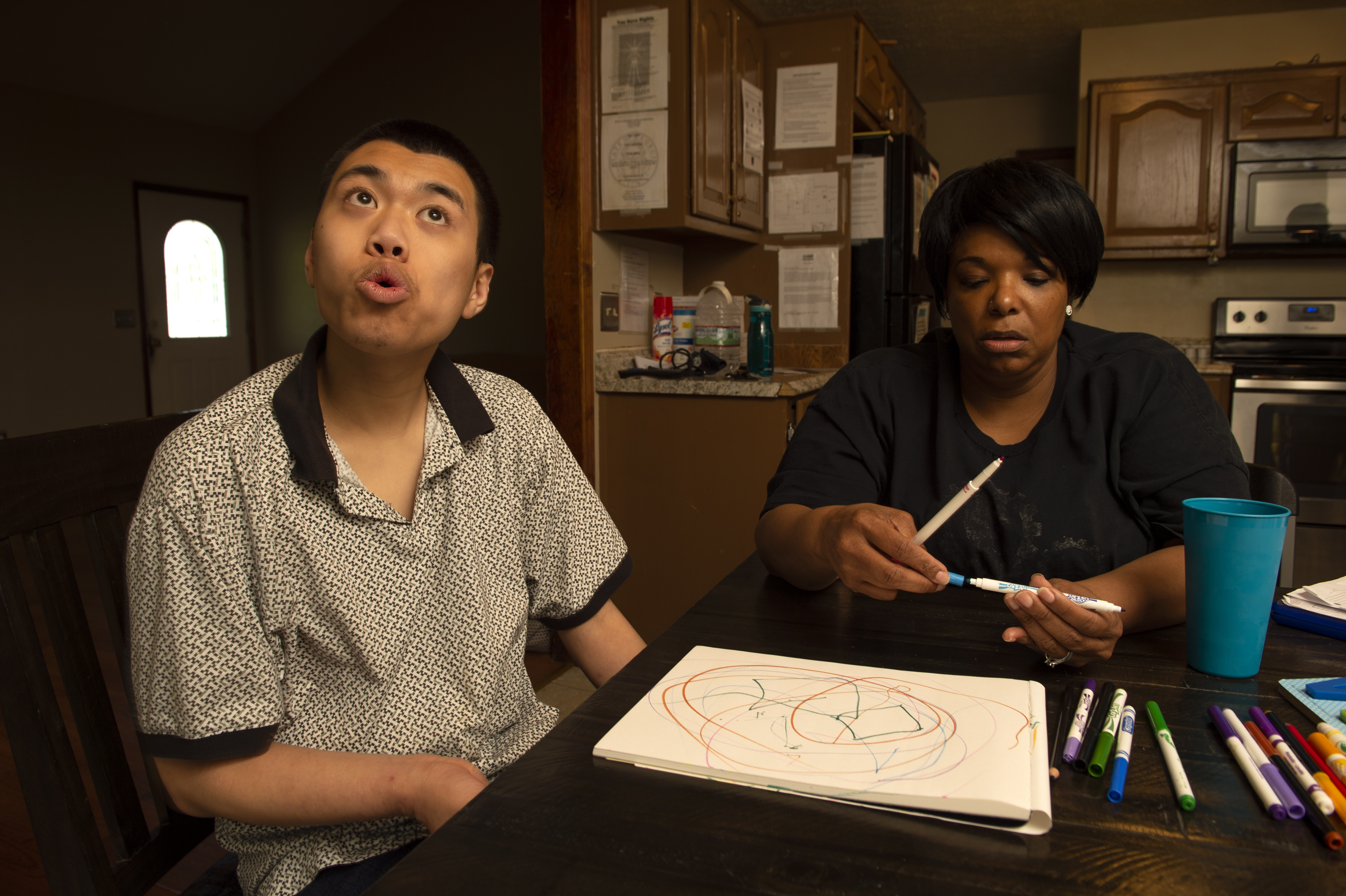
William Ha, 22, gets a nudge from his direct support staff to create a new drawing with his favorite markers while a temporary resident at a state-operated crisis home in Gainseville, GA. William, who experiences severe autism and is non-verbal, was relocated to the crisis home after he aged-out of another facility and had nowhere to go. State officials were unable to place him in a more stable location due to lack of available rooms anywhere in the state until recently.
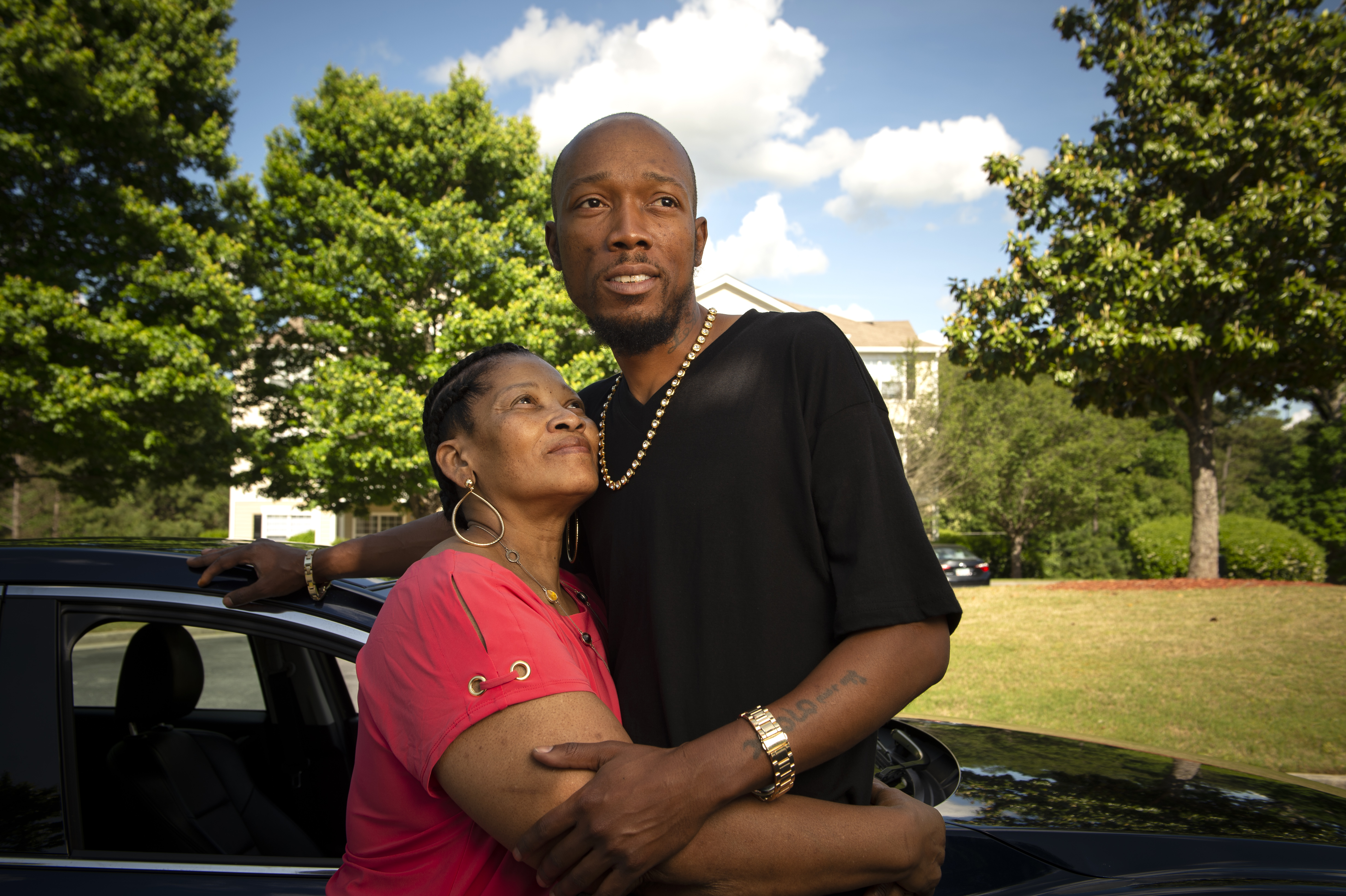
Andrew Foston, 47, was confined to the forensic unit at Central State hospital for nearly seventeen years because of his schizoaffective disorder. Atlanta Legal Aid Society attorneys advocated for his release and he was relocated to a restrictive community integration home, also operated by the state. He still longed to live outside the insitutations. “I wanted to actually have a life, maybe working with cars, maybe even driving,” Andrew said. After several more relocations in and out of state facilities, Atlanta Legal Aid secured his release to live with his mother Betty, and he looks forward to finding a job soon.
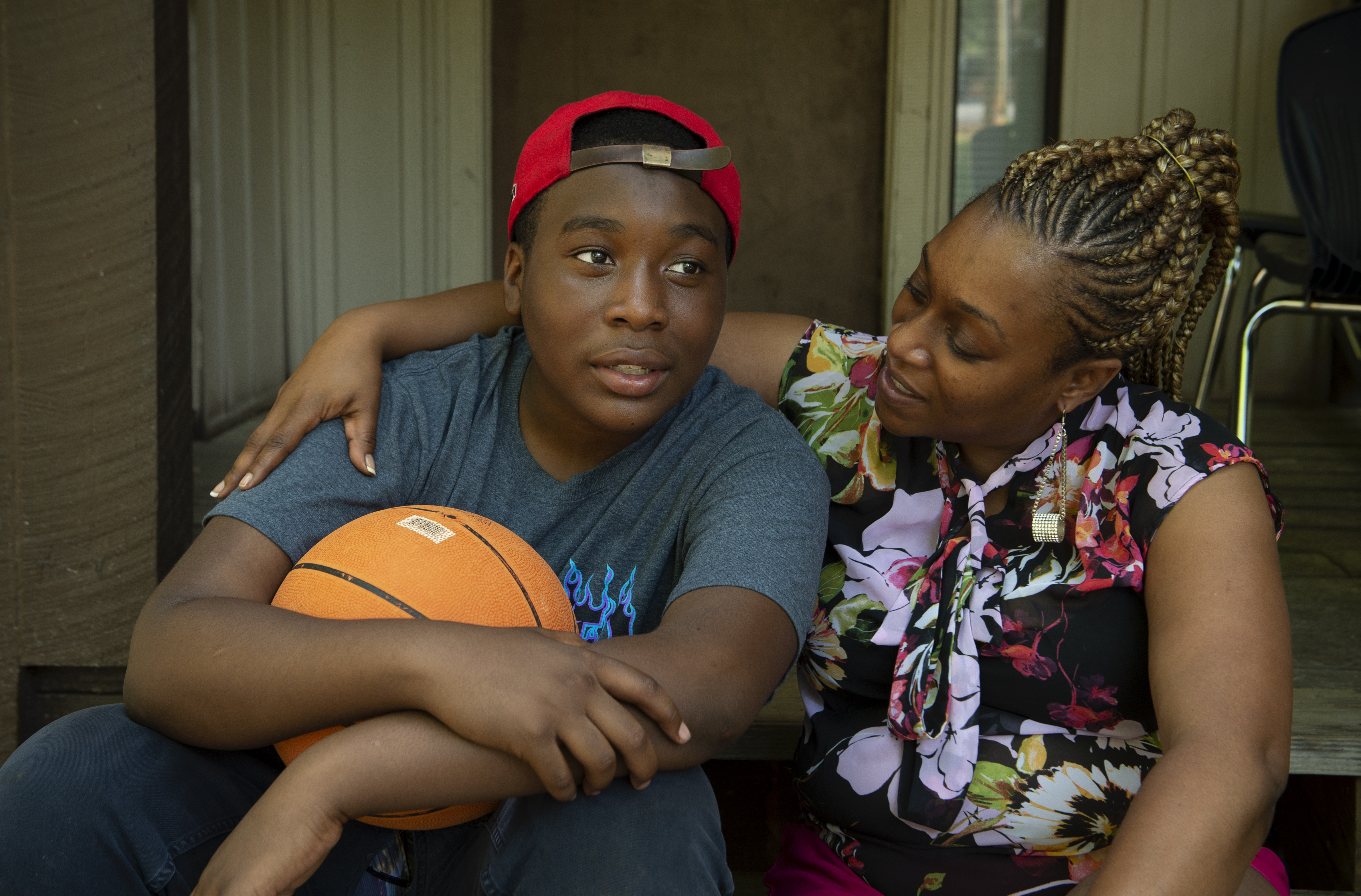
Diagnosed as bipolar with attention deficit and oppositional defiance disorders, Kamau Noble was just twelve when he was handcuffed by a school resource officer at a meeting where school officials were supposed to be deciding whether mental illness was driving the boy’s tendency to lash out. Accused of attacking another student and of talking back to the officer at the county alternative school where he was housed, Kamau began to cry.
“It was such a sad situation,” said Atlanta Legal Aid lawyer Murti Bhakta. “He didn’t need to be secluded… in an environment where there was chaos, where there was no real order, where he was surrounded by other kids constantly getting in trouble.”
But Tucker Middle School officials were willing to take a chance. And under their tutelage, Kamau began to thrive, she said. “He did amazing. It was a night-and-day difference.”
“All he needed was a change of environment and a staff attuned to what he needed.”

Tykeem has autism that has left him unable to speak and, as a teenage, made him prone to extreme behaviors that cycled him in and out of hospital emergency rooms. Tykeem’s mother, Deborah Valentine, has multiple sclerosis and faces her own physical challenges. But with support provided through the Comprehensive Supports Medicaid waiver, Tykeem now lives in a group home with 24/7 support, where he is able to visit regularly with his mom.”
If you have a child with a disability, you are constantly thinking, “How is this child going to manage after I’m gone?,” said Susan Goico, managing attorney of Atlanta Legal Aid’s Disability Integration Project.” We as a society need to help these families so it is not such a weight. We as a society need to make sure these adult children are taken care of. It makes such a difference to families so they are not terrified about what’s going to happen to their child.”
